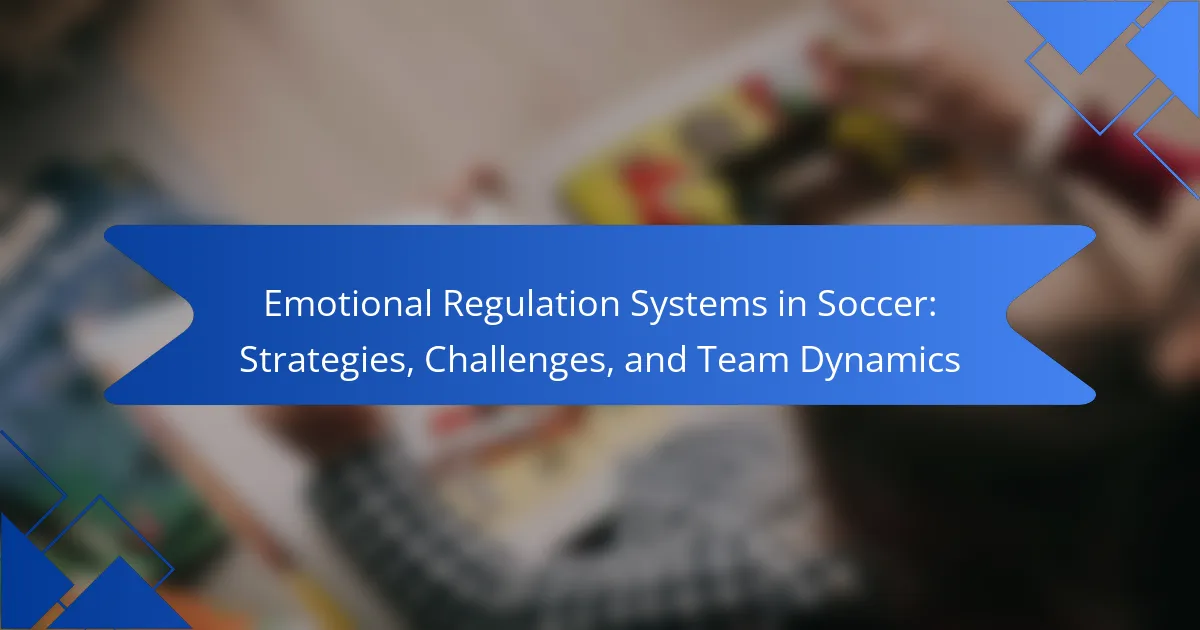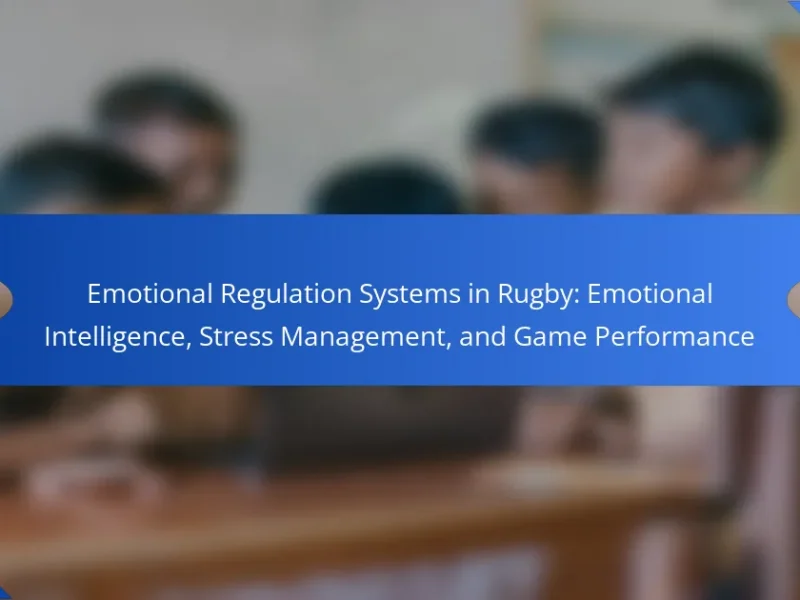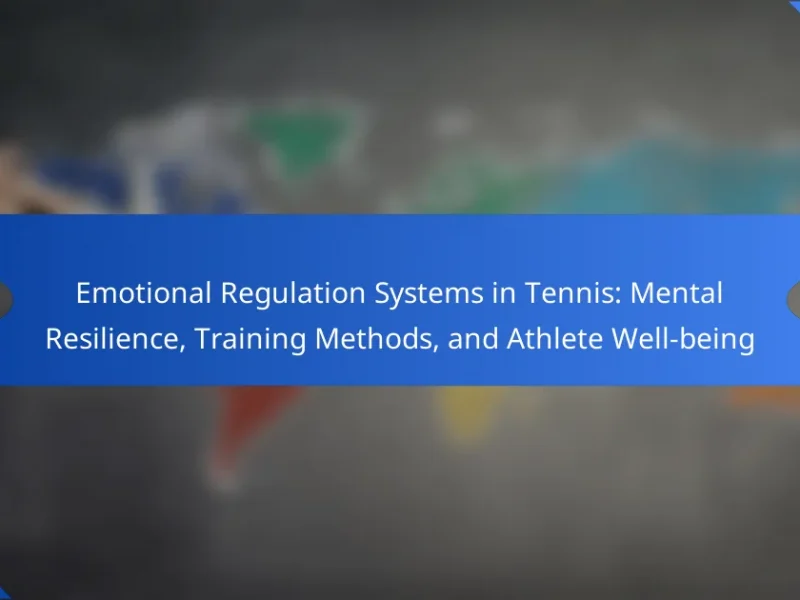Emotional regulation systems in soccer are crucial for managing stress and enhancing performance. This article explores effective strategies like mindfulness and cognitive reframing, the challenges players face under pressure, and how team dynamics can be improved through supportive environments. Understanding individual emotional responses and fostering open communication are key to achieving resilience and cohesion within teams.
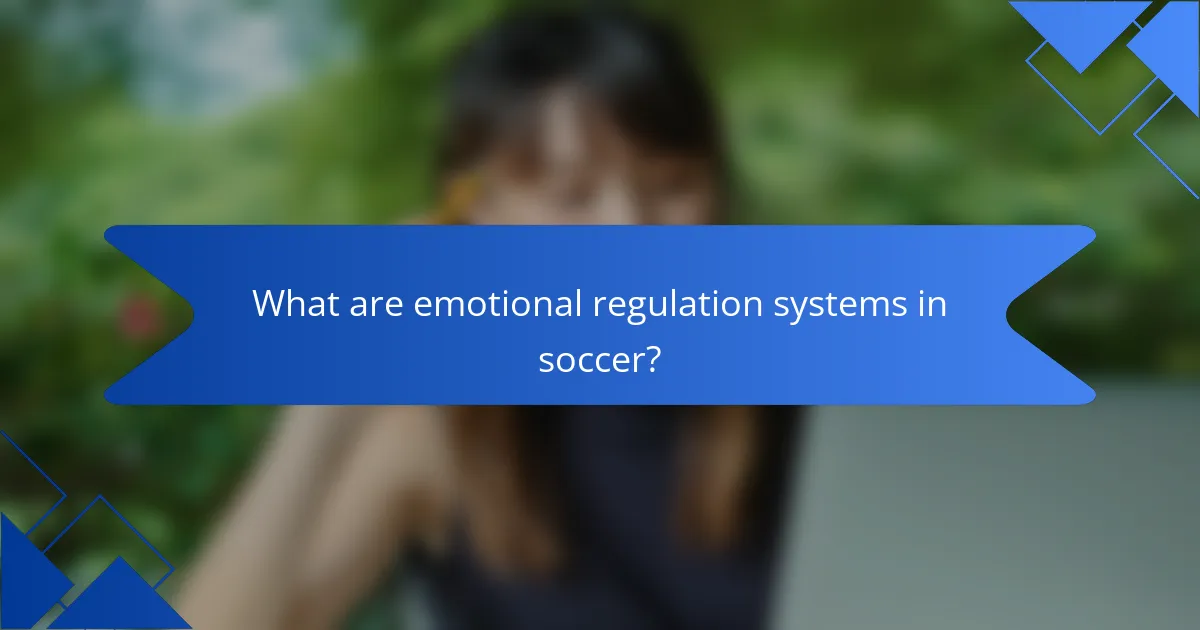
What are emotional regulation systems in soccer?
Emotional regulation systems in soccer are strategies that players and teams use to manage emotions during games. These systems enhance performance and foster positive team dynamics. Key strategies include mindfulness, cognitive reframing, and emotional awareness. Challenges arise from high-pressure situations and interpersonal conflicts. Effective emotional regulation can lead to improved focus, resilience, and cohesion within the team.
How do emotional regulation systems impact player performance?
Emotional regulation systems significantly enhance player performance by improving focus and resilience. Effective emotional management helps players cope with stress, maintain motivation, and foster teamwork. For instance, players with strong emotional regulation skills can quickly recover from setbacks, leading to better decision-making during critical moments. This ability is crucial in high-pressure situations, where emotional stability directly influences game outcomes.
What role do emotional regulation systems play in team dynamics?
Emotional regulation systems significantly enhance team dynamics in soccer by fostering effective communication and collaboration. These systems help players manage stress, maintain focus, and respond constructively to challenges. For example, teams with strong emotional regulation skills often show improved cohesion and performance under pressure. Additionally, effective emotional regulation can reduce conflicts and enhance trust among teammates, leading to a more positive team environment.
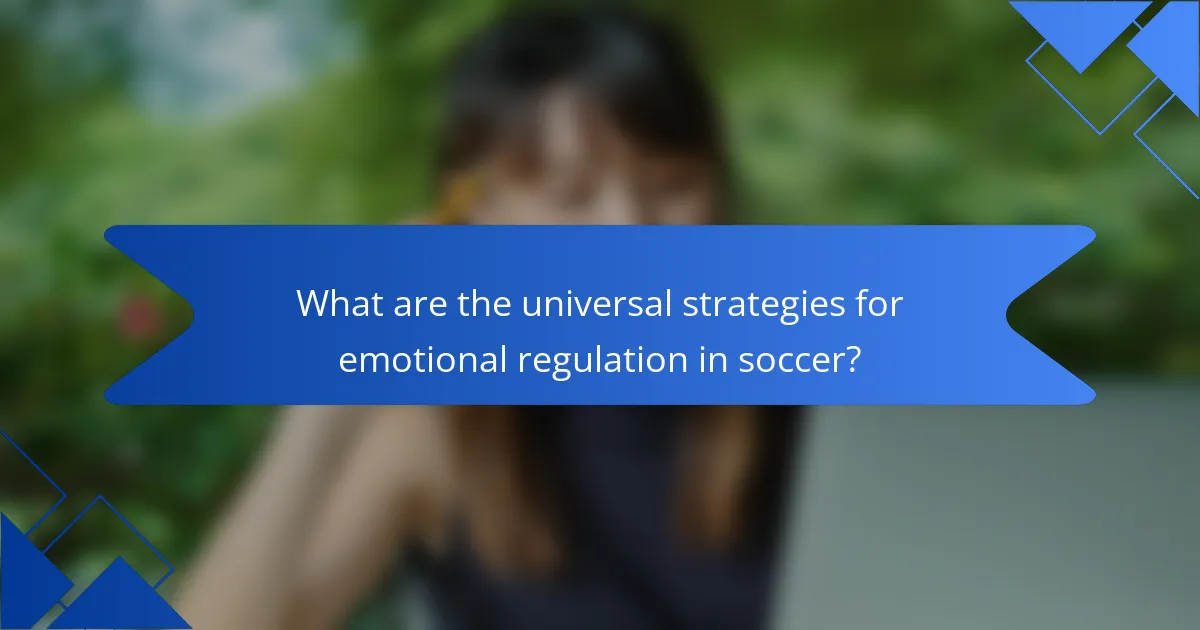
What are the universal strategies for emotional regulation in soccer?
Effective emotional regulation strategies in soccer include mindfulness, cognitive restructuring, and positive self-talk. These techniques help players manage stress and maintain focus during matches. Mindfulness enhances present-moment awareness, allowing players to stay calm under pressure. Cognitive restructuring involves reframing negative thoughts into positive ones, fostering resilience. Positive self-talk boosts confidence and motivation, essential for peak performance. Embracing these strategies can significantly improve team dynamics and overall game outcomes.
How can players utilize self-awareness for emotional regulation?
Players can enhance emotional regulation through self-awareness by recognizing their feelings and triggers. This understanding allows them to manage stress and maintain focus during games. Techniques like mindfulness and reflective practices can improve self-regulation. As a result, players can make better decisions and foster positive team dynamics.
What techniques enhance emotional control during matches?
Techniques to enhance emotional control during matches include mindfulness practices, cognitive reframing, and team support systems. Mindfulness helps players stay present and focused, reducing anxiety. Cognitive reframing encourages a positive outlook on challenges. Team support fosters a collaborative environment, enhancing emotional resilience.
How does breathing control affect performance?
Breathing control significantly enhances performance in soccer by improving focus and reducing anxiety. Effective breathing techniques help players regulate emotions, leading to better decision-making and team dynamics. For example, controlled breathing can lower heart rates, enabling players to maintain composure during high-pressure situations. This emotional regulation is crucial for sustaining performance throughout a match, particularly in critical moments.
What role does visualization play in emotional regulation?
Visualization plays a crucial role in emotional regulation by enhancing focus and reducing anxiety in soccer players. Using mental imagery, athletes can simulate game scenarios, which helps them manage stress and improve performance. Research shows that visualization techniques can lead to better emotional control, allowing players to respond effectively to challenges during matches. This practice fosters a positive team dynamic by promoting resilience and confidence among players.
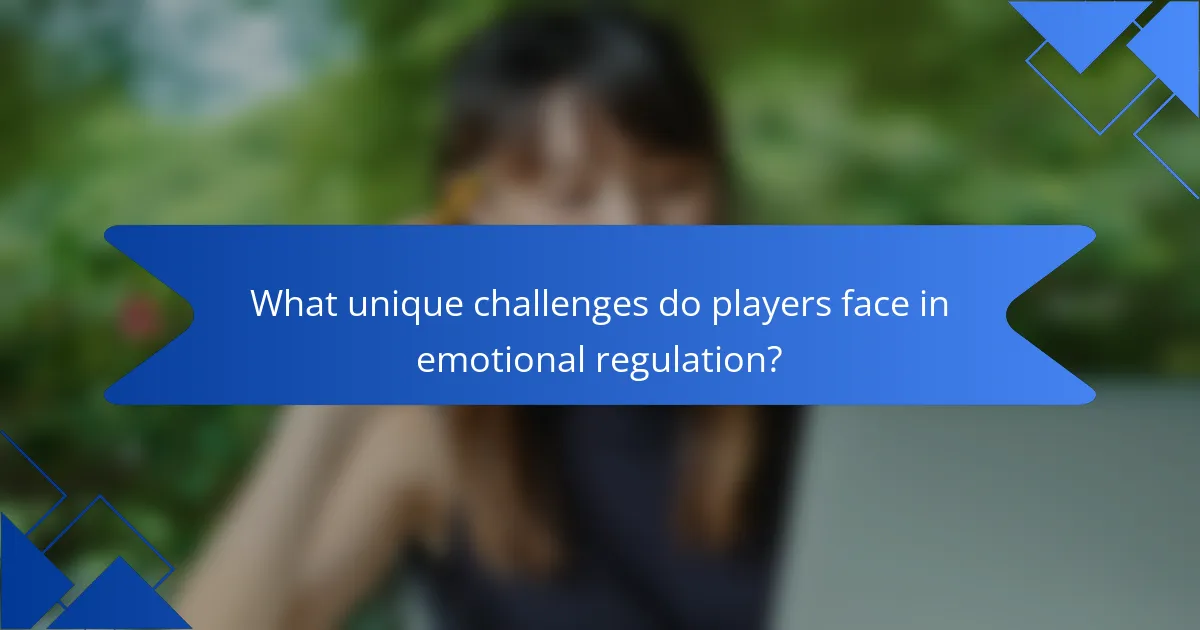
What unique challenges do players face in emotional regulation?
Players face unique challenges in emotional regulation, including pressure to perform, intense competition, and team dynamics. These factors can lead to heightened stress and anxiety, impacting decision-making and performance. Developing coping strategies, such as mindfulness and communication, is essential for managing these challenges effectively. Additionally, the unique attribute of individual emotional responses can vary widely among players, necessitating personalized approaches to regulation.
How do external pressures influence emotional responses?
External pressures significantly shape emotional responses in soccer, impacting players’ performance and team dynamics. Factors like crowd expectations, media scrutiny, and competitive stress can heighten anxiety and alter emotional regulation. Players may experience increased pressure to perform, which can lead to both positive and negative emotional responses, influencing teamwork and individual decision-making. Understanding these dynamics helps teams develop strategies to manage emotions effectively, fostering resilience and enhancing overall performance.
What unique emotional triggers affect soccer players?
Unique emotional triggers for soccer players include competition, teamwork, and pressure. Competition drives motivation, while teamwork fosters a sense of belonging. Pressure can trigger anxiety or focus, impacting performance. Understanding these triggers is essential for emotional regulation, enhancing team dynamics and individual resilience.
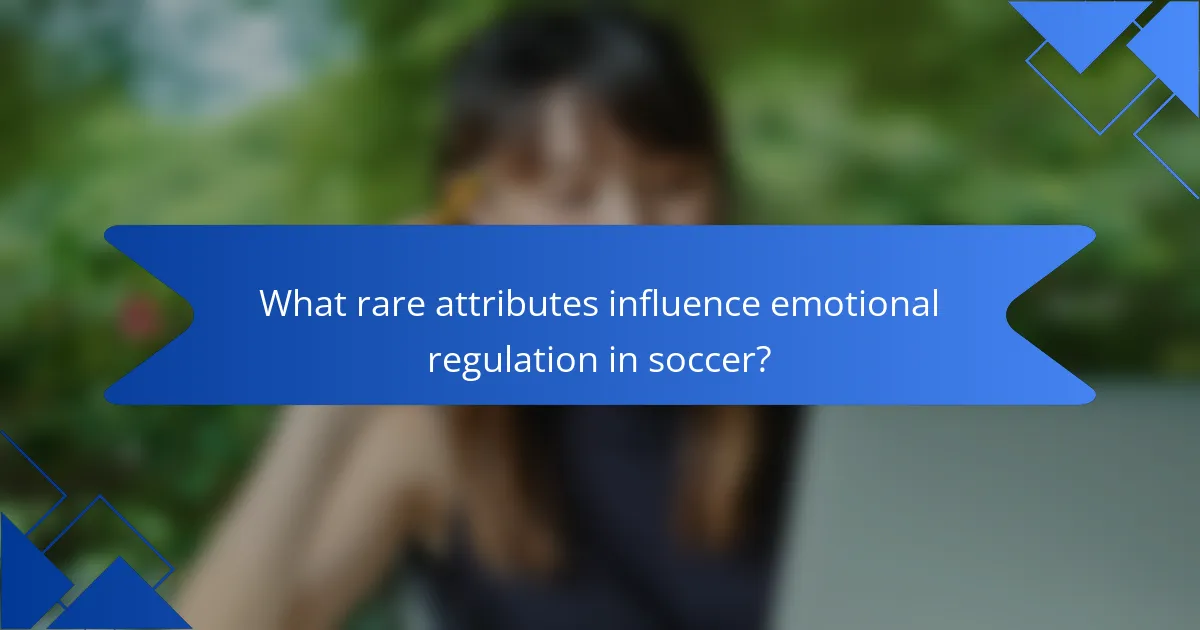
What rare attributes influence emotional regulation in soccer?
Rare attributes influencing emotional regulation in soccer include individual resilience, cultural background, and unique coping mechanisms. These factors can significantly impact a player’s ability to manage stress and maintain focus during high-pressure situations. For instance, players from diverse cultural backgrounds may exhibit different emotional responses to challenges, affecting team dynamics. Additionally, individual resilience can determine how effectively a player bounces back from setbacks, influencing overall performance. Understanding these rare attributes can enhance coaching strategies and team cohesion.
How do cultural differences impact emotional expression in teams?
Cultural differences significantly influence emotional expression in teams, affecting communication and collaboration. Team members from collectivist cultures may prioritize group harmony, while those from individualist cultures may express emotions more openly. This can lead to misunderstandings and conflicts if not managed properly. For instance, in soccer, players from diverse backgrounds may interpret emotional cues differently, impacting team dynamics. Understanding these cultural nuances enhances emotional regulation strategies, fostering a more cohesive team environment.
What is the effect of individual player backgrounds on emotional regulation?
Individual player backgrounds significantly influence emotional regulation in soccer, affecting team dynamics and performance. Players from diverse cultural, socioeconomic, and personal histories bring unique emotional responses to stress and pressure. For instance, players with a supportive family background may exhibit stronger emotional resilience, while those facing adversity might struggle with regulation. Understanding these differences allows coaches to tailor strategies that enhance emotional management, fostering a cohesive team environment. Moreover, recognizing individual emotional triggers can improve communication and conflict resolution within the team.
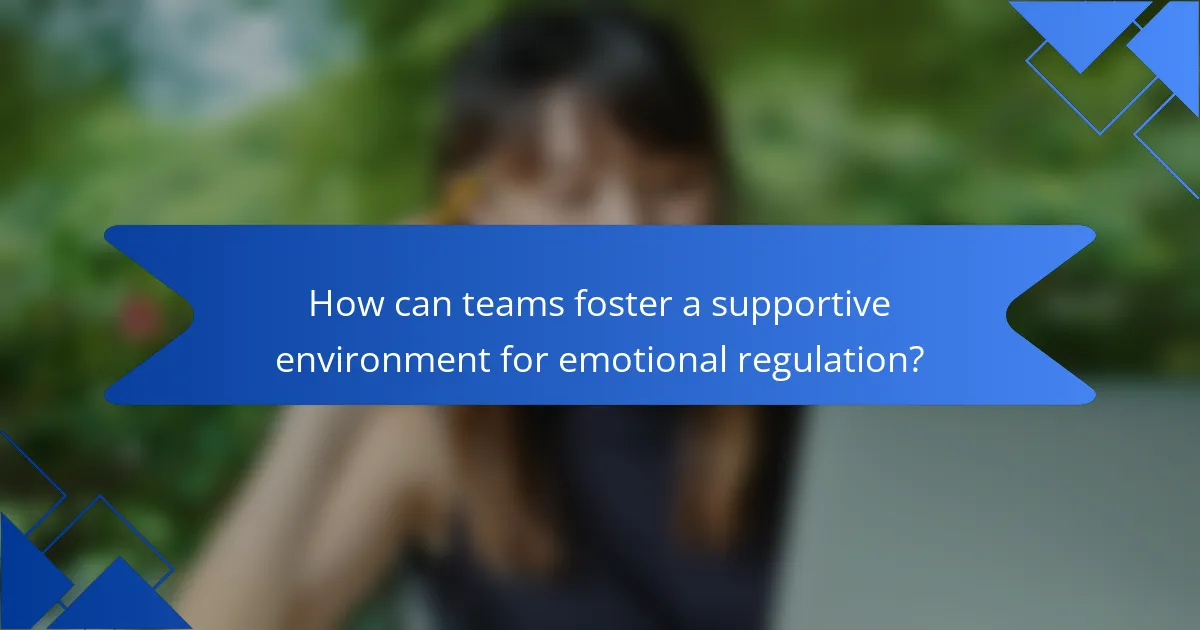
How can teams foster a supportive environment for emotional regulation?
Teams can foster a supportive environment for emotional regulation by promoting open communication and trust. Encouraging players to express their feelings reduces stigma and fosters connection. Implementing regular check-ins helps identify emotional challenges early. Training sessions can include mindfulness practices to enhance self-awareness and coping strategies. Establishing a culture of support allows players to seek help without fear of judgment, ultimately improving team dynamics and performance.
What best practices can coaches implement for emotional support?
Coaches can implement various best practices for emotional support, enhancing team dynamics and emotional regulation. Regular check-ins foster open communication, allowing players to express feelings. Creating a safe environment encourages vulnerability and trust. Implementing mindfulness techniques helps players manage stress and emotions effectively. Lastly, providing constructive feedback nurtures resilience and growth.
What common mistakes do teams make regarding emotional regulation?
Teams often overlook the importance of proactive communication and emotional awareness in emotional regulation. Common mistakes include failing to establish clear emotional guidelines, neglecting individual emotional triggers, and not fostering a supportive environment. These oversights can lead to misunderstandings, increased tension, and decreased performance. Additionally, teams may struggle with inconsistent emotional responses, which can create a lack of cohesion and trust. Addressing these issues through targeted strategies can enhance team dynamics and overall effectiveness.
How can players develop resilience through emotional regulation?
Players can develop resilience through emotional regulation by using strategies to manage their emotions effectively. This involves recognizing emotional responses, practicing mindfulness, and employing techniques like deep breathing. These strategies help players maintain focus and composure during high-pressure situations, enhancing team dynamics. Emotional regulation fosters a supportive environment, enabling players to bounce back from setbacks and improve overall performance. By addressing challenges in emotional control, teams can cultivate resilience, leading to better outcomes on the field.
What expert insights can enhance emotional regulation strategies?
Expert insights can significantly enhance emotional regulation strategies in soccer by focusing on team dynamics and individual resilience. Techniques such as mindfulness training improve players’ awareness of their emotions, leading to better decision-making under pressure. Additionally, fostering a supportive team environment encourages open communication, allowing players to express feelings and receive constructive feedback. Incorporating regular emotional check-ins helps identify challenges and build coping mechanisms. Ultimately, these strategies promote mental toughness, essential for navigating the high-stakes nature of competitive soccer.
